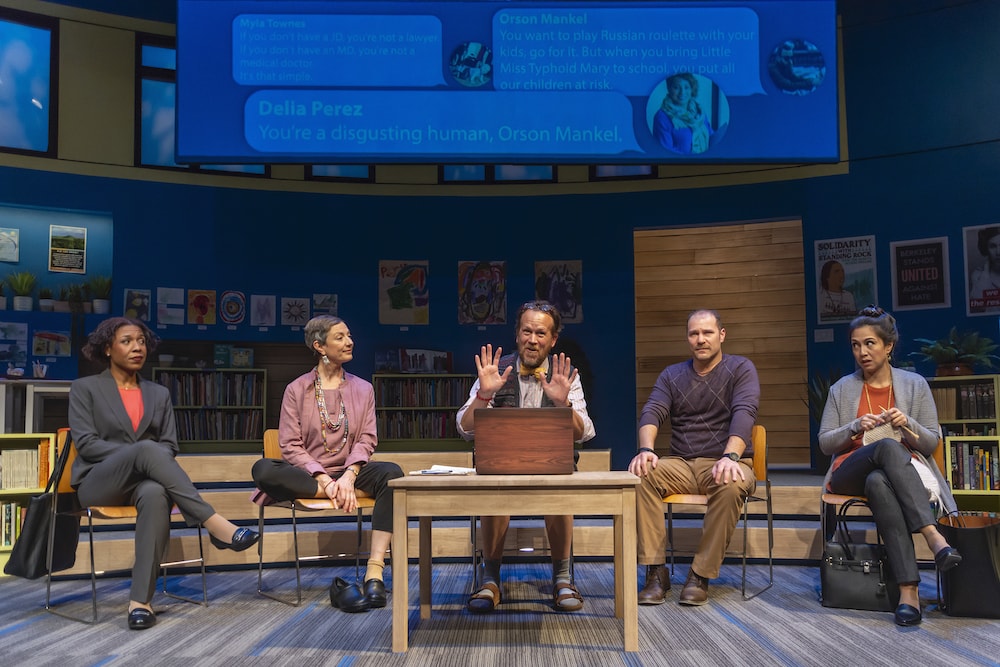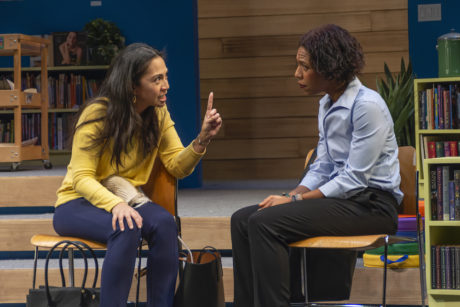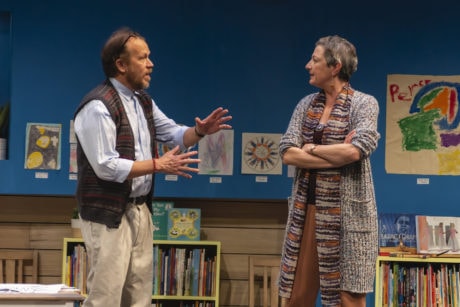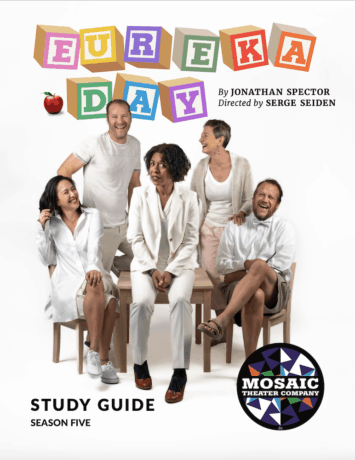The five adults seated onstage in a children’s classroom each have a kid enrolled in this private day school, which like the play we’re watching is named Eureka Day. These earnest parents are all trying to be super-conciliatory toward one another, as though childish conflicts are impolitic and amicable consensus is perfectly possible. Except beneath their sunny California smarm seethes a seriously divisive controversy. It’s about whether students should be required to be vaccinated, and it could rip the school apart. So the grownups in the room try to make nice. They keep replying to one another with waffly responses like “yes/no,” “no/right,” “yeah/no but”—as if to blunt any umbrage that might result from snarky contradiction. Meanwhile microaggressions abound.
It’s a setup for hilarity and conflict and skewering progressive pretensions, and Jonathan Spector’s knife-edge-funny Eureka Day cuts to the quick.

Managing Director and Producer Serge Seiden directs the quippy Eureka Day at a nifty clip. The production comes hard on the heels of another Mosaic Theater Company show set in an educational environment, the college-level Theory by Norman Yeung, which was about online trash-talk. The programming connection between the two plays is more than scene deep. Thematically—this being what Mosaic calls its #WokeSeason—both plays expose pieties that progressives presume at our peril. Both frame very intense arguments that are happening in the real world. In each, the politics of pedagogy are (to go all academese) interrogated (ahem). Even the two sets (designed consecutively and similarly by Daniel Ettinger and Andrew Cohen) have been graded on the same curves.
An emphasis on education has always been implicit in Mosaic’s brand and its mission to make intercultural and socially relevant art. The company’s website features this quote from Augusto Boal, the Brazilian hero to radical theater practitioners:
Theatre is a form of knowledge; it should and can also be a means of transforming society. Theatre can help us build our future, rather than just waiting for it.

I too believe that theater is transformational knowledge. It can be an ongoing lesson about one’s world and a lens into oneself as essential as any information medium and as illuminating as any classroom or therapy session. In my view, theater belongs in everyone’s lifelong learning. But even I, an avid theatergoer, know that it would be terrible marketing to say, “See this play and learn stuff you don’t know about [topic XYZ]! Come see this show and understand yourself!” If a show sounds like it’s going to get preachy or teachy, I’ll pass, thankyouverymuch.
So how does Mosaic do it? How does Mosaic manage to be both hilariously entertaining and edifying at the same time? The paired education-centered storytelling in Theory and Eureka Day made me curious to find out.
“This season we’re talking about stages of awakening,” Mosaic’s Associate Artistic Director Victoria Murray Baatin told me. (She directed Theory and heads up the company’s Education and Outreach Initiative.) “There’s a connective thread through all the plays about things that are urgent and exhilarating, things that are happening in real life.

“We wanted to query and question the ways people think they have a certain level of consciousness, where that breaks down, and how it’s a process that’s continually evolving. We want people to not pat themselves on the back or be self-congratulatory with these stages of awakening, but continue to move forward and grow in their understanding.”
That self-conscious squirm definitely happened in Theory, which challenged the limits of liberals’ love for free speech, and it happens again in Eureka Day, which confronts the health price kids pay when liberal parents go their own way.
In his insightful review of Eureka Day, my colleague Bob Ashby posed two knotty questions:
How do we maintain respectful relationships with people with whom we fundamentally disagree? And ultimately, how do we resolve an issue on which there is intractable disagreement?
Here’s how Baatin untangled those questions:
“Theater as a tool allows us to have that cerebral intellectual space that we’re working through, but it also pierces the heart. So if you’re able to feel something in a specific play, and empathize with another point of view as a result of having that effect of penetrating your heart, then disagreement becomes less intractable.
“In Eureka Day, for example, characters don’t ultimately find an ability to see eye to eye, but once you get past all those microaggressions, there’s a true moment of respect. After all the histrionics, there is a quiet moment when they hear one another. I think that’s what the theater can offer us: a chance to hear one another, even if we can’t fully agree.
“Theater gives us an opportunity to shift perspective so that you can have different entry points and different ways of learning. This social and emotional model of learning is one that we’ve really plugged into.”
Among Mosaic’s education and outreach initiatives are discounted student and senior matinees, which are followed by facilitated talkbacks that often feature intergenerational learning and listening. (“You know Mosaic, we love to talk back,” Baatin noted.) Audiences for these performances typically come from senior centers with which Mosaic has longstanding relationships.

Mosaic also participates in the DC Arts and Humanities Education Collaborative, where teachers can select artistic opportunities for their students grouped by grade level. Busing is available, and Mosaic offers downloadable study guides that support the DC Public Schools educational curriculum and standards. During the run of Native Son, for instance, English and literature classes came that were reading Richard Wright.
I caught Eureka Day for the second time at one such matinee, and I was struck again by how well made is Spector’s play. As its stakes steadily heighten, audience engagement escalates, and throughout there were audible reactions to the gender- and race-based slights and the character-arc surprises.
I was also struck during the talkback by how intently audience members framed their questions. This happened to be a talkback with the cast moderated by Baatin, and during it one audience member asked the actors whether their characters’ views on vaccination corresponded to their own. As they answered, we learned that all have children themselves—and not necessarily convergent views. It was a remarkable moment of evidence of theater’s power to model how to disagree on a divisive issue and get along with respect.
Running Time: Two hours, including one intermission
Eureka Day plays through January 5, 2020, presented by Mosaic Theater Company in the Lang Theater at the Atlas Performing Arts Center, 1333 H Street NE, Washington DC. For tickets, call (202) 399-7993 ext. 2 or go online.
READ Bob Ashby’s review, “Mosaic Theater’s ‘Eureka Day’ puts immunization in the hot seat”
RELATED: John Stoltenberg’s Magic Time! column, “Mosaic’s brazenly brainy ‘Theory’ is both a treatise and a treat”
SPOTIFY PLAYLIST, including songs played preshow:




